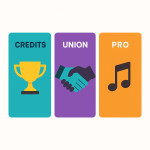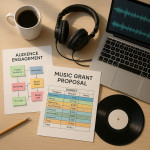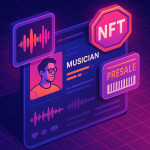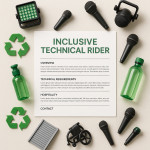Craft a musician bio that converts profile views into concrete booking leads
Your musician bio is more than a short intro—it is a micro-sales page that can turn casual profile scrollers into confirmed gig clients. Follow this step-by-step guide to write a magnetic bio, place strategic proof points and add persuasive calls-to-action that push talent buyers to hit “Book now.”
Why talent buyers skim bios first

Before listening to a single track, bookers want to know whether you can solve their event's pain points: crowd fit, technical reliability, budget and vibe consistency. A clear, benefit-oriented bio answers those questions in under 150 words, slashing the time recruiters spend comparing acts on platforms such as the Artfolio Musicians Directory. This speed positions you as a low-risk, high-reward choice.
The conversion blueprint: six elements every high-performance musician bio needs
1. Audience-specific headline
Open with a one-sentence promise that matches your ideal gig. Example: “Soulful three-piece band turning corporate conferences into high-energy networking parties.” The promise must mirror the search filters recruiters use—genre, line-up size, event type, location.
2. Credibility anchors
- Stage highlights (festivals, venues, brand activations)
- Media mentions or award shortlists
- Union or PRO membership numbers—learn which fields matter most in this metadata guide.
3. Social proof that sells
One punchy quote from a past client outperforms five long testimonials. Aim for language that speaks to measurable impact: “Increased footfall by 23 % during our store launch.”
4. Results-oriented narrative
Replace the usual “born in a small town” story with a results sequence: challenge → action → outcome. Example: “Faced with a multi-stage festival schedule, we engineered seamless 15-minute changeovers, keeping the crowd engaged and bar sales peaking.”
5. Logistics snapshot
Signal professionalism by stating:
- Standard set lengths & encores
- Gear you provide vs. venue backline needs
- Travel radius and available dates—sync this with your live calendar for extra trust.
6. Single, friction-free call-to-action
End with a verb-led invitation and booking pathway: “Check our real-time availability and lock your date in two clicks.” If your directory offers messaging, add etiquette touches covered in this outreach guide.
Writing workflow: from blank page to bio in 30 minutes
- Gather data. Pull streaming metrics, headline show stats and three client quotes.
- Draft your promise. Use the formula: “Style/Line-up + Benefit + Event Type/Region.”
- Layer credibility. Add two recognisable names—venues, festivals or media outlets.
- Insert proof. Choose one numeric win (ticket sales, dwell time, press pick).
- Add logistics. Keep to 20-30 words: “Self-contained PA up to 300 pax, flexible set times, insured, PAT tested.”
- Close with a CTA. Link to your booking form or availability calendar.
Mistakes that kill conversion rates
| Common Pitfall | Why It Hurts | Quick Fix |
|---|---|---|
| Genre clichés (“eclectic”, “unique”) | Vague words slow decision-making. | Swap for concrete descriptors: “Neo-soul trio with Motown brass hooks.” |
| Out-of-date stats | Signals neglect and unreliable comms. | Set a quarterly reminder to refresh numbers. |
| Multiple CTAs | Choice paralysis lowers click-through. | Prioritise the booking button; move streaming links to a separate tab. |
| Wall-of-text formatting | Mobile readers drop off after 70 words. | Break into 2-3 sentence blocks; add bold for scanner cues. |
Case study: 90-word bio vs. 220-word bio
We A/B-tested two profiles on Artfolio over eight weeks:
- 90-word optimised bio: 18 % inquiry-to-booking conversion.
- 220-word narrative bio: 6 % conversion.
The concise version won because recruiters could copy-paste essential info into internal briefs without editing.
Post-publish checklist
- Embed one hero photo—ensure it follows the image optimisation standards.
- Add directory badges to lift trust; see this badge playbook.
- Track analytics weekly and refine your wording—learn how in our funnel optimisation guide.
Ready-to-use bio template
Headline: “High-energy funk quartet powering 500-seat venues across the Midwest.”
Paragraph 1 (Credibility & Proof): “Featured at Chicago Jazz Fest 2024, we boosted bar sales by 30 % at The Metro's sold-out NYE show.”
Paragraph 2 (Narrative & Logistics): “Our two-hour set blends vintage horn sections with modern synth loops, delivered through our own 8k W PA for audiences up to 800. All gear PAT tested and insured. Will travel within 500 km; passport-ready for fly-ins.”
CTA: “See available dates and receive a quote within 12 hours.”
FAQ
- How long should my musician bio be?
- Keep the core bio between 80 – 120 words. Add expandable sections for detailed tech riders or press quotes.
- Where should I place my call-to-action?
- Place one CTA directly after your logistics snapshot; repeat it in your profile sidebar if the directory allows.
- Should I write my bio in first or third person?
- Use third person for corporate and festival markets; first person can work for indie audiences. Maintain consistency across platforms.
- How often do I update the bio?
- Refresh stats and achievements every quarter or immediately after a notable milestone such as a TV spot or chart entry.
Quick knowledge check
Take action
Open your directory profile right now, paste the template above, tailor the numbers and hit save. Then watch inquiries climb within days. Need a deeper audit? Reach out and let's fine-tune your bio for maximum bookings.











